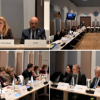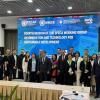News
Displaying Results 1 - 25 of 84
Critical minerals are essential for the energy transition as are intergenerational equity in resource management and the engagement of youth. With this in mind "Critical Minerals for the Sustainable Energy Transition: A Guidebook to Support Intergenerational Action” was launched today at the UNECE…
The COVID-19 pandemic and the regional conflicts have negatively affected economic development in Eastern Europe and the South Caucasus (EESC), significantly disrupting international trade, investment and cooperation. To achieve a resilient recovery and support the transition to knowledge-based and…
The raw materials sector is at the forefront of global challenges and opportunities of the 21st century, as it plays a vital role in the energy, transport, and digital transitions required to mitigate and adapt to climate change. However, the sector also faces significant pressures from consumers,…
At the World Economic Forum Annual Meeting in Davos, UNECE Executive Secretary Tatiana Molcean highlighted the role of UNECE’s legal instruments, standards and tools in dealing with the most pressing global challenges, namely climate change, digital and green transformations, low-carbon energy…
Originally introduced in policy and development discussions in 2011, the water-food-energy-ecosystem nexus approach has evolved into a pivotal framework for sustainable development and achieving the Sustainable Development Goals (SDGs).
Work on the water-energy-food-ecosystems nexus under the…
In a rapidly evolving world, grappling with climate change and the triple planetary crisis, transformative innovation stands as a crucial solution to these pressing challenges. Strategic learning is increasingly recognized as a key component in both ecosystem development and the broader realm of…
UNECE and partners are working together to support North Macedonia in its green energy transition by building capacities to finance energy efficiency (EE) and renewable energy (RE) projects.
To this end, UNECE and UNDP organized two training sessions on design and verification of energy…
As countries seek to rapidly decarbonize their economies, investing in energy efficiency and the improved performance of buildings offers significant near term gains. Available measures can help transform the building and construction sector, which today is responsible for approximately 40% of…
The European Commission has proposed a new legislation, the European Critical Raw Materials Act, to ensure a secure and sustainable supply of critical raw materials for the EU. The Act, on which the European Parliament and the European Council reached a provisional agreement on 13 November,…
Global goals – just like regional and national goals — can only be achieved if we work together. This is a reason that revitalizing partnerships is at the heart of the Sustainable Development Goals (SDGs).
With this in mind, under the umbrella of the Regional Collaborative Platform, regional…
Central Asia has significant untapped potential to decarbonize its energy systems and accelerate the sustainable energy transition, including through renewable energy development and enhanced resource management. To help the region capitalize on these opportunities, UNECE, the United Nations…
With a long history of reliance on resource-based industries for growth, countries of the United Nations Special Programme for the Economies of Central Asia (SPECA) - Afghanistan, Azerbaijan, Kazakhstan, Kyrgyzstan, Tajikistan, Turkmenistan, and Uzbekistan - have embraced the power of innovation…
UNECE support for the revision of the Georgian Mining Code Act is shaping the future of resource classification and estimation standards in Georgia. During a workshop in Tbilisi participants discussed how Georgian standards could play a crucial role in harmonizing with the global dimensions of the…
In the Drina River Basin, shared mainly by Bosnia and Herzegovina, Montenegro and Serbia, working together across borders and jointly addressing water and energy challenges is a key part of effective climate action and the green transition.
As part of the Sarajevo Energy and Climate Week (25-29…
The Republic of Moldova is almost entirely dependent on energy imports as it has no domestic sources of fossil fuels and makes only limited use of its renewable energy potential. At the same time, the energy intensity in the country is 3.4 times higher than the average energy intensity in the…
UNECE and partners have started implementation of a multi-year project on “Improving the energy efficiency of the global building supply chain industry and its products to deliver high performance buildings” (full project budget EUR 19.8 million), funded by the International Climate Initiative (IKI…
UNECE presented its innovation policy insights during the Small Business Act for Europe (SBA) stakeholder meeting at the Organisation for Economic Cooperation and Development (OECD) on 19 June 2023 in Paris. This meeting was a platform for experts on small and medium enterprises (SME) policy,…
Countries in the Eastern Europe and South Caucasus (EESC) sub-region (Armenia, Azerbaijan, Georgia, the Republic of Moldova, and Ukraine) must boost their efforts to diversify and upgrade their economies through innovation for long-term, sustainable growth and resilience, in light of recent crises…
The transition towards a circular economy could create an estimated 4.5 trillion USD of global economic growth by 2030, while helping to restore natural systems. Within the landlocked countries of Central Asia, this transition can help economies diversify away from a dependence on exports of finite…
Young professionals from industry, academia, and civil society came together to discuss and explore solutions for sustainable resource management at the UNECE Resource Management Week 2023. Hosted by the UNECE Resource Management Young Member Group (RMYMG), the highly interactive session provided a…
In a move towards sustainable resource management, several countries have presented case studies of how the United Nations Framework Classification for Resources (UNFC) can scale-up harmonized resource management. UNFC provides a common language and standards for the classification of all energy…
Faced with shortages of petrol and diesel since the start of the war in February 2022, and with the rising impacts of the ongoing energy crisis, Ukraine aims at strengthening energy security through the development of renewable energy, notably biofuels and biomass.
Key challenges and…
Significant energy price increases arising from the war in Ukraine are having a negative impact on food production capabilities and costs in Georgia, especially in rural areas. This threatens to weaken the competitiveness of producers and increase their vulnerability to poverty. Reducing energy…
Innovation and Technology, which is the focus of this year’s International Women’s Day, presents powerful opportunities for gender equality, and offers welcome hope at a time of great challenges for women’s empowerment. In fact, the regional progress report on the Sustainable Development Goals (…
Decarbonizing industry remains a key challenge for climate action: according to the International Energy Agency, industrial activity was directly responsible for emitting 9.4 Gt of CO2 in 2021, accounting for a quarter of global emissions (not including indirect emissions from electricity used for…
























